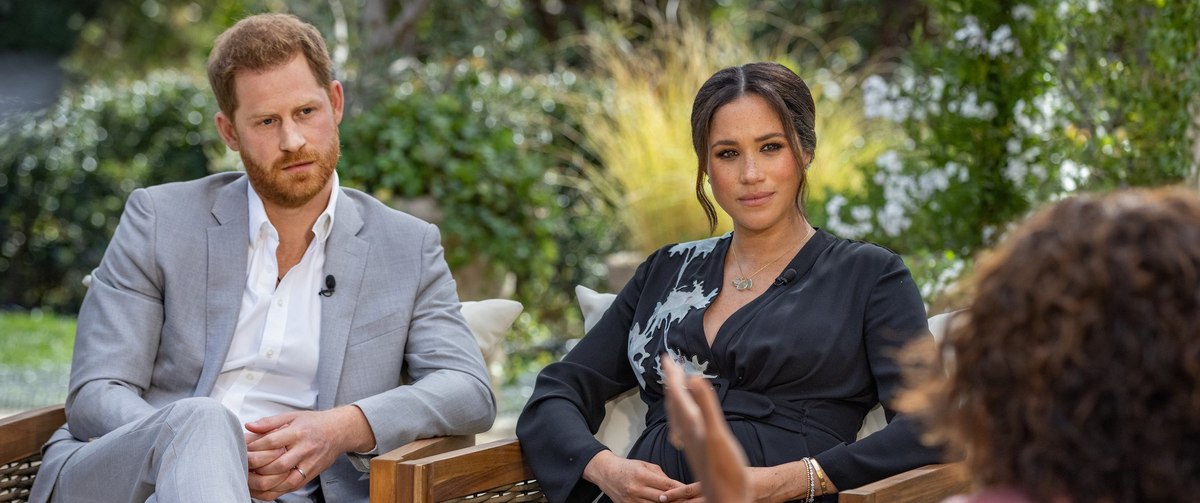
Snap poll: what Americans made of Meghan and Prince Harry’s interview with Oprah
On Sunday, Prince Harry and Meghan Markle sat down with Oprah Winfrey for a two-hour interview about why they decided to step down from their roles in the Royal Family.
Among other revelations, Markle said that she felt she had been silenced and not protected by the British monarchy. Markle, who is biracial, shared that when she was pregnant, there were “concerns and conversations” among the Royal Family about how dark her son’s skin tone would be.
A YouGov Direct poll of 2,104 US adults finds that Americans tend to believe that it was appropriate for the couple to take part in the interview (44% to 20%) - in stark contrast to public opinion in Britain where the opposite is true (47% call it inappropriate, while 21% say it was appropriate).
Among those who watched the interview or read news stories about it, two-thirds (68%) say they have sympathy for Harry and Meghan, with 35% saying they have “a lot” of sympathy for the couple. Far fewer (27%) express sympathy for the senior members of the Royal Family, specifically with regards to the situation with Harry and Meghan.
Americans overall are twice as likely to sympathize with Harry and Meghan (47%) than they are to sympathize with the Royal Family (23%).
In the United Kingdom, it’s a different story. A similar YouGov poll conducted on Monday finds that just 12% of Britons say they have “a lot” of sympathy for Harry and Meghan, while 17% have “a fair amount.” One-third (33%) of Britons have no sympathy at all for the couple. But they don’t overwhelmingly support the Royal Family either – 39% say they feel sympathetic toward senior members of the family, but 45% say they don't have very much (25%) sympathy for them, and 20% say they have no sympathy at all for the royals.
Americans say race has played a role in how Meghan has been treated
One aspect of the interview that has been widely discussed is Meghan’s assertion that while she was pregnant with the couple’s son, Archie, royal family members expressed concerns about “how dark his skin might be when he’s born.” Most (67%) Americans call the statement racist, with Black (85%) and Hispanic Americans (75%) being especially likely to say so.
Three in five white Americans (62%) also call the concerns racist, while one in five (20%) say they are not.
In general, Americans tend to believe that Meghan’s race has played a role in how she was treated by members of the Royal Family, as well as the British press. Since beginning a relationship with Prince Harry, Meghan has often been the subject of intense scrutiny by UK tabloids.
Most Americans (58%) believe that Meghan’s race played a role in how she was treated by other members of the Royal Family, with 42% saying they think this played a “major role.” Black Americans (72%) are especially likely to say her race played a major role in how she was treated by the monarchy, while another 13% say it played a minor role.
Similarly, 61% of US adults believe that the Duchess of Sussex’s race affected how she was treated by the British press, with 44% saying it played a “major role.” Black Americans (76%) again are especially likely to believe that Markle’s race was a major factor in how she was treated by outlets in the UK.
See the toplines and crosstabs from this YouGov poll and email uspress@yougov.com for additional information.
Related: How popular are the British royals in America?
Methodology: YouGov polled 2,104 US adults, including 793 who watched at least some portion of the interview, 290 who read/watched news stories analyzing it, and 713 who heard about the interview but did not watch or see any coverage of it. The survey was conducted on Monday, March 8 between 11:17 am and 11:42 am Eastern Standard Time. Data is weighted on age, gender, education level, race, and political affiliation to be nationally representative of adults in the United States. The margin of error is approximately 3.0% for the overall sample.
Image: Getty